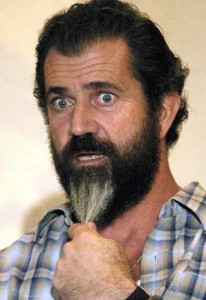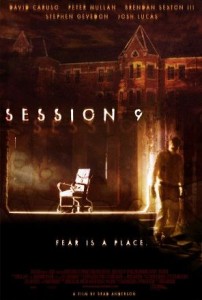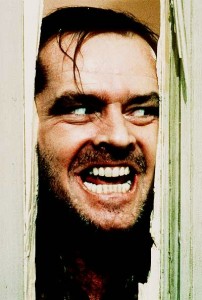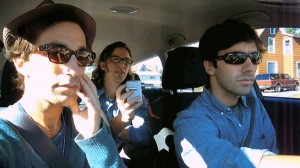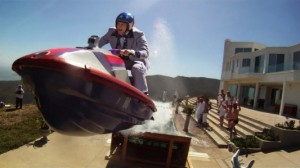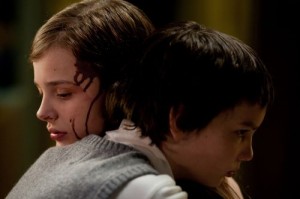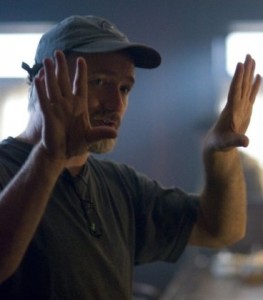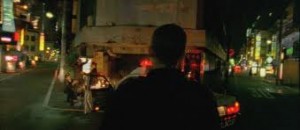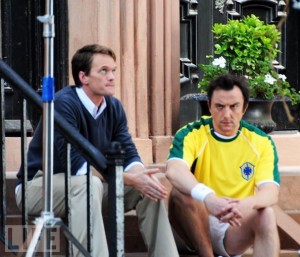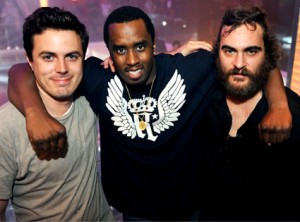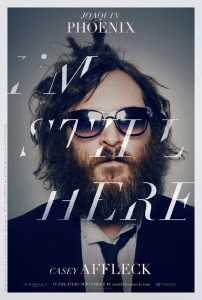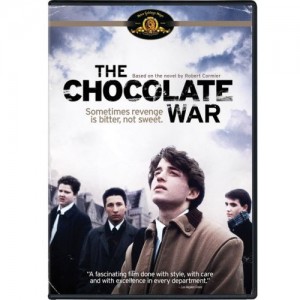Yesterday I had the immense pleasure of speaking with the lovely and talented Tilda Swinton. I recently caught up with her performance in Luca Guadagnino’s I Am Love and was rather moved by it. By any standard, Swinton is award-worthy for the tamed intensity she brings to the part. It’s a melodramatic film, but one that definitely has a bolder artistic vision than the average melodrama.
Speaking with Ms. Swinton by phone yesterday, she had a lot to say about how the film was made and such, but what I was most struck by was how warm she was. Often, she is cast as a cold figure, so I was surprised by the tenderness of her voice. I would ordinarily upload this as a podcast, but the quality of my taping wasn’t easy to listen to, so I’ve transcribed it for you.
Tilda: Hi Noah.
Noah: Hi Tilda. I just wanted to say, first of all, I’m an enormous fan. I’ve been a big fan of yours since I saw The War Zone when I was 17.
Tilda: Thank you very much.
Noah: I Am Love, I just saw it yesterday and I was really impressed by it. And I was just so curious how you became involved in the film and what attracted you to this particular story and this particular character?
Tilda: Well, Noah, as you may or may not know, this film is something that came out of my relationship with Luca Guadagnino. It’s something we devised together. We started talking about a film like this about 11 years ago and we started building up the narrative about 7 or 8 years ago. It was a film that we talked for a long time before we had any idea about what the milieu of the story might be, about the kind of film in which melodrama would slip into tragedy somewhere along the line. And a film that I would call “sensational,” that wouldn’t be particularly dialogue-based, a film that worked on all sorts of “language of cinema” levels.
We had made an essay-film together about 7 or 8 years ago called The Love Factory, which is an interview between Luca and I, in which he talks to me and it’s just a close-up on me. And during the course of this conversation, we talked about love. And afterwards, when we were editing the film, we decided to take this idea, the germ of this concept of a revolutionary love in the life of a woman who I would play and we would place that at the heart of the narrative. So that was the first we had, this woman who I would play who would come across some kind of revolution in her life based on love. Thereafter, we started to think that she would be some kind of alien in some kind of milieu that she hadn’t been born into. It was a time when we didn’t know it would necessarily be set in Italy, but fairly soon we decided to set it in Italy.
It took longer to work out where she was going to come from, but at a certain point she became Russian. Not only because we were reading a lot of Tolstoy at the time [Laughs] but also because we worked out that because we wanted to set the film in this very kind of haute bourgeois milieu in Milan, we wanted to set it at the highest point of milieu, which is about ten years ago at the start of the century. And so if you go backwards from that, that makes her a Soviet Russian and we wanted her to come from a world that she could never return to. So all of these things, it kind of became a detective story, working out how things had to be in order for the feeling to be right. So it took a while.
Noah: In a sense, you’re kind of an alien to this material as well because you’re playing a Russian who is playing an Italian…
Tilda: Yeah.
Noah:…so I think that’s very interesting. It did remind me a bit of Anna Karenina in a lot of ways…
Tilda: Yeah…yeah.
Noah:…but it actually reminded me a lot of the Kubrick film, Barry Lyndon, which is one of my favorite films.
Tilda: Not only because Marisa Berenson is in it [Laughs].
Noah: [Laughs] Right, I was going to say, Marisa Berenson being in it really brought that home. But just because every shot is so deliberately composed. And I was wondering, as an actor, do you feel it gives you more or less freedom when the frame is so, uh, composed. I mean, when it’s so fixed? Because it seems like every shot is so well-staged that I was wondering if you like to be able to roam around or is it good to know the constraints of the frame?
Tilda: I mean, to be honest with you: you always know what the constraints of the frame are whether the camera is hand-held or not. It’s always important to work very closely with the camera because the camera’s all you got really, frame is everything. So if the frame is fixed, as you say, and very iconic, that tells you absolutely how you’re going to operate within it. But by the same token, if you’re being followed by a hand-held camera, that’s also a constraint if you like. That’s also a dance. One of the things that we really wanted to do from the very beginning was to approach a film about rich people in a kind of humanistic way. Very often – and I know this from working on a film called Orlando with Sally Potter, which was also about rich people in a humanistic way – there’s a sort of mesmerism that seems to happen when you make a film about rich people, like the camera gets sent into a sort of sleep. Very often, people find themselves grinding to a halt, filming in a very theatrical, static way. And we wanted to play with this, so that we would have the possibility of being back in a very cinematic way, having long wide-shots so you actually get the full milieu. But then at the same time we wanted the camera to be quite free so that it would also be able to come in very closely and be round the back of someone’s ear or under someone’s armpit or actually very, very close to their features so that you could see them as humans and not just as some theatrical animals on a set. And this is one of the reasons that we worked with Yorick Le Saux, who is this great cinematographer who I worked with on Julia and who I introduced Luca to, who had that capacity to be on the one hand very formal, but also very intimate and very fluid. So we wanted to shake it up, but at the same time we wanted to have – I will tell Luca what you said about Barry Lyndon, because that’s an enormous compliment to him and to us because Kubrick is one of our favorite filmmakers and Barry Lyndon is the pre-eminent modernist look at that kind of formal setting. And I think that’s a great compliment.
Noah: It’s also a film about this perpetual outsider, which Emma [Swinton’s character] certainly is. She’s trapped in this gilded cage. Speaking about the way the film was shot and edited, I think that makes the ending even more satisfying because it’s just this kind of burst of energy which hits you on such a visceral level.
Tilda: The very strange thing about the ending is that the ending is in many ways the first thing we had. When I say we worked on the film for 11 years, what I mean is that those early years, before we even knew what the narrative was going to be, we were thinking about a kind of emotion that we wanted to hit. And the most excited we could be was a film that ended in a certain way – even outside of any details of what the narrative would be, we knew that we wanted a film that the denouement of which would be silence. Just have no dialogue. And would have a relationship with music and a relationship with movement that was more choreographic, that was more like a ballet or more like an opera than traditional cinema.
So I would say that from the moment of the “pool scene” (for readers who don’t know what we we’re talking about), from that moment on there’s really nothing spoken. And we had that fixed in our mind – not the details of what would actually happen – but we had the emotion, the color, this incredibly high, operatic feeling and we had this in our mind. I always say it was like we had an apple and we put in on the top of a pedestal and we knew that in working out the narrative for the rest of the film, it was like building a staircase up to that apple. Because we knew where we were going to end, but we just didn’t know how it was going to start [Laughs] or what the middle was going to be, for the longest time.
So that was really the challenge, to find a way up to the apple; and it was touch and go and I’m sure there are people who don’t think we got there, but it was a very particular challenge to work out the end of a film before the beginning or the middle.
Noah: I think that’s a fascinating way to work. The only other time I think I’ve heard about a filmmaker doing something like that is I believe that Paul Thomas Anderson, when he did Magnolia, he knew the last image he wanted on the screen…
Tilda: Interesting.
Noah: …so the whole film was kind of like a way to get to that image.
Tilda: Yeah, how interesting.
Noah: You’ve worked with some of my favorite filmmakers – everyone from Bela Tarr to Jim Jarmusch to David Fincher to the Coen Brothers. Do you think it’s more important to work with a great artist behind the camera or is it more important to find a great piece of material?
Tilda: Well, I’m never one for finding material. I mean, I always find the people first. That’s just the way I’ve worked. Luckily, I’ve had the very good fortune of starting by making films with people and making the material with them, so they always came first just in terms of the chronology. And I’ve had the really blessed experience recently with people like the ones you mentioned coming to me with pieces of material. But it’s always the people that I’ve gone into a dance with – in my view whatever material Jim Jarmusch comes up with or Bela Tarr or the Coen Brothers – I’m always going to want to go and dance with them because I really love them, for a start, and I really think that the dialogue and whatever they’re going to do is going to be interesting. I’m trying to think if I’ve ever had a piece of material come my way – I’ve always made my deal with the person. It’s an arrangement that I’m very happy with. It’s what I’m interesting in really – the conversation with the filmmakers. And friendship, to be perfectly honest, because I’ve been really blessed and some extraordinary people ring me up.
Noah: Do you ever have any interest in directing yourself? Or dancing with yourself, so to speak?
Tilda: No, I’m really trying not to direct. Really, really hard. [Laughs]
Noah: It’s a constant effort to not direct?
Tilda: There are some friends – Luca is one of them – that are constantly teasing me, but I’m not going to give in. I like to be in communication, in a sort of dialogue with someone else. Collaboration is my forte, so not at this moment, it’s not what I’m interested in, no.
Noah: Do you have any people on your wish list of people you’d like to work with that you haven’t yet?
Tilda: Of course. [Laughs] But I’ve had the happy experience of meeting them around the corner. It’s a very strange thing that people do tend to meet themselves in this meal pond that we work in. And certainly in the milieu that I work in, which tends to be coming from a kind of – if not underground, then certainly independent world where people really understand collaboration and the need for fellowship. In that world, there’s a lot of comradeship around and people do tend to bump into each other and introduce each other to other people and it’s very easy to make relationships. And I’m happy to say that I’m constantly finding new relationships.
For example, at the moment, I’m starting to develop a piece of work with Apichatpong Weerasethakul [Uncle Boonmee Who Can Recall His Past Lives]. He’s someone that I’ve been in communication with for a while and we’re now beginning to get down to talking about the film we’re going to make together. And that’s just wonderful.
Noah: I read that you have a movie coming out with Lynne Ramsay, who is fantastic and works so rarely, so what a great opportunity.
Tilda: Yeah, yeah, well we all, including she, wishes she wouldn’t work so rarely. So let’s hope that she doesn’t work so rarely from now on. But this is something we’ve been developing for a few years together and at last we’re cutting it now and we’re very excited about it.
Noah: Ah, well I can’t wait for that. And news just broke either today or yesterday that you may or may not be attached to Wes Anderson’s new film [Moonrise Kingdom].
Tilda: I may. He’s the most recent lovely person who has sent me an e-mail [Laughs].
Noah: I know you’re busy, so I’ll let you go, but I have one more question and it’s something I ask everyone I interview. What is your favorite movie?
Tilda: So unfair, that question. If you asked me what my 100 most favorite movies would be, that would be easier. Oh lord. I was asked recently online what my 5 favorite movies are, and I randomly picked 5 out of my head and within a few minutes, I wanted to pick another 5. But one is really cruel. Let me just quickly think.
[Long pause]
Well I always say Au Hasard Balthazar and I always say I Know Where I’m Going. And I very often say To Be or Not to Be by Ernst Lubitsch.
But tonight, because I just finished watching it with my children, I’m going to say What About Bob?
Noah: Oh what a great movie, I love that one!
Tilda: [Laughs] So tonight my favorite movie is What About Bob?
Noah: Well that is one of the greatest answers I’ve gotten to that question. Well, thank you very much for your time, I really appreciate it.
Tilda: Thanks Noah, have a good night, bye!







